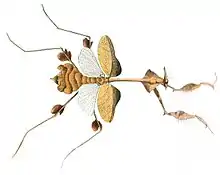Gongylus gongylodes
Gongylus gongylodes, also known as the wandering violin mantis, ornate mantis, or Indian rose mantis, is a species of praying mantis in the family Empusidae. Characterized by extremely slender limbs with large appendages, it is not a particularly aggressive species and often kept as a pet. The mantis is especially known for swaying its body back and forth to imitate a stick flowing in the wind.[1] It primarily feeds on flying insects. Its native range is in southern India and Sri Lanka. It can reach up to 11 cm (4.3 in) long. The males of the species are capable of flight. They are a communal species, in that they are able to live and breed in large groups, without unnecessary cannibalism. Adult females are about 10cm (3 in) and adult males are about 9 cm.
| Gongylus gongylodes | |
|---|---|
 | |
| Gongylus gongylodes | |
| Scientific classification | |
| Domain: | Eukaryota |
| Kingdom: | Animalia |
| Phylum: | Arthropoda |
| Class: | Insecta |
| Order: | Mantodea |
| Family: | Empusidae |
| Genus: | Gongylus |
| Species: | G. gongylodes |
| Binomial name | |
| Gongylus gongylodes | |
| Synonyms | |

Its specific name gongylodes means "roundish" in Greek,[2] from the same word as its generic epithet Gongylus.
Gallery
 G. gongylodes
G. gongylodes.jpg.webp) G. gongylodes
G. gongylodes.jpg.webp) G. gongylodes
G. gongylodes.jpg.webp) G. gongylodes
G. gongylodes Violin mantis at Madikai Ambalathukara, Kerala, India
Violin mantis at Madikai Ambalathukara, Kerala, India Violin mantis
Violin mantis
References
- French, Jess. Minibeasts with Jess French: Masses of Mindblowing Minibeast Facts! Bloomsbury Wildlife, 2018.
- Stearn, William Thomas (1983). Botanical Latin. 275. David & Charles. ISBN 978-0-7153-8548-7.
gongylodes / gongyloides: roundish
- Texas A&M University